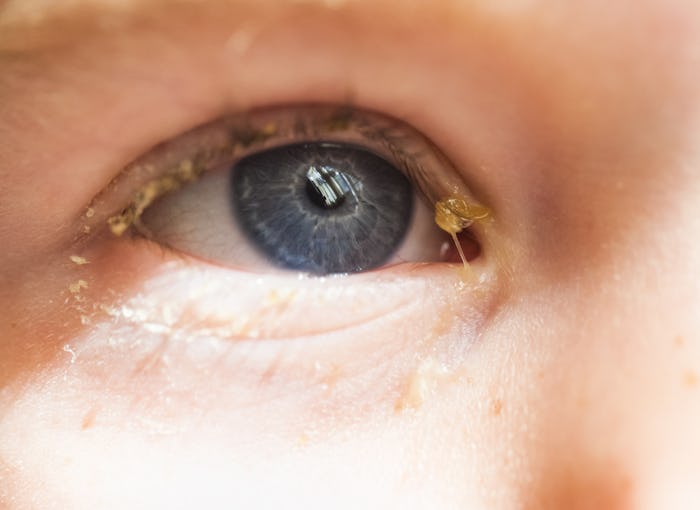Life

Turns Out, Your Kid's Pink Eye Came From Exactly Where You Thought It Did (Ew)
When I was in college, I worked part-time at a daycare. While I generally loved playing with toddlers and little kids during my time outside of the classroom, there were two things that sent shivers down my spine: lice and pink eye. Grossly enough, both seem basically inevitable when you're surrounded by children. We all remember those mandatory lice checks in school, but many people don't know the story about pink eye. How do kids get pink eye? What are its symptoms? And, most importantly, how can we prevent it?
First, let's get into the nitty gritty details. According to WebMD, pink eye is the laypersons word for conjunctivitis, or an inflammation of the conjunctiva. The conjunctiva is "the thin clear tissue that lies over the white part of the eye and lines the inside of the eyelid," per WebMD. When you contract pink eye and the conjunctiva becomes inflamed and irritated, the whites of your eyes look – you guessed it – pink. Symptoms that typically accompany the redness are excess tears, itching, blurred vision, light sensitivity, and a discharge that can make your eyes stick shut after sleeping. In other words... pink eye can be pretty gnarly.
The term pink eye actually covers a variety of similar eye issues, all resulting in those irritated, pink eyes. They can be caused by several different culprits, from viruses and bacteria to allergic reactions to irritants like soap and smoke. According to the Mayo Clinic, the most common type of pink eye is caused by a virus, and that's the one most likely to send your child home from school. Because children are in such close proximity at school and daycare, this kind of pink eye gets passed around quickly and easily.
Pink eye is spread in a few different ways. According to the Centers for Disease Control and Prevention (CDC), "Most viruses that cause conjunctivitis spread through hand-to-eye contact by hands or objects that are contaminated with the infectious virus. Having contact with infectious tears, eye discharge, fecal matter, or respiratory discharges can contaminate hands." In order to combat the spread of pink eye, you'll want to focus on teaching and reinforcing hygienic habits. Because pink eye is spread so easily through hand-to-eye contact, encourage your child to not rub their eyes. When you see them doing it, remind them of how dirty their little hands are, and how sensitive their eyes are. Remind them to wash their hands regularly and thoroughly as well — though I'm sure that's a battle you're already fighting.
If you've determined your poor child has pink eye, you'll want to focus on managing the symptoms. Over-the-counter eye drops can alleviate the itchiness or "grittiness" of the eyes and help your child feel more comfortable. I personally found hot compresses to be the most beneficial and soothing when I've had pink eye. Have your child lay down, run a clean wash cloth under some hot water, and have them relax with it over their eyes for a few minutes. This should help alleviate the symptoms and clean off some of that irritating crust that builds up. If your child wears contact lenses, disinfect them and keep them out until their pink eye has cleared up. If possible, keep your child home from school until their eyes have cleared up, as well.
Despite how contagious and downright annoying pink eye can be, it very rarely poses a serious threat to your vision. According to the Mayo Clinic, once you've determined that your child has pink eye and you've started treating it, symptoms should go away within 12 to 24 hours. If the symptoms seem to be getting worse, or if you're worried about a symptom your child's experiencing, take a visit to the doctor. They can confirm the diagnosis and potentially prescribe something to speed up the healing process.
Pink eye is uncomfortable and inconvenient, but it's also common and typically short-lived. Don't freak out when your child inevitably brings it home at some point during their academic career. Manage the symptoms, teach your child about good hygiene, and relax.